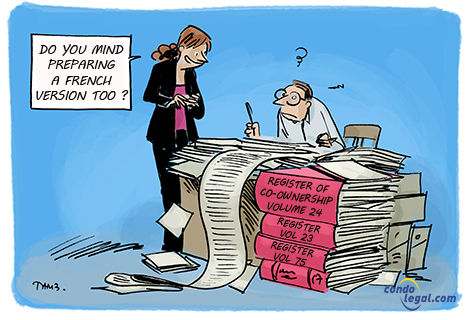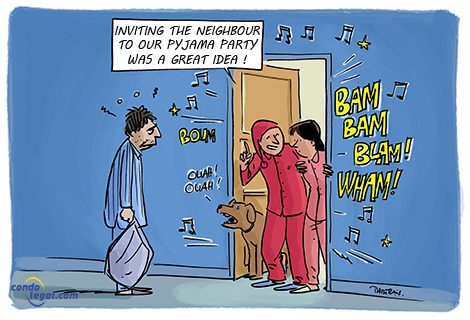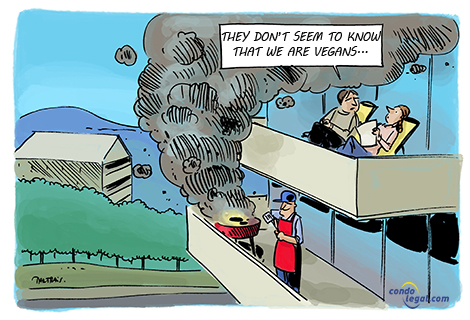Close neighborhood
.jpg) Has a condo in divided co-ownership caught your attention? Are you seriously considering buying it, but first, you'd like to know more about the immediate neighborhood? To gather additional information beyond what the seller has provided, you will often need to conduct your own investigation. This step is important on account of the possibility of abnormal neighborhood annoyances caused by noise, odors and smoke, the main cause of co-owners’ conflicts. It is therefore essential to visit the area at different times of the day to get a realistic sense of the atmosphere. Talking to current neighbors can also provide valuable insights into the habits and social climate of the building.
Has a condo in divided co-ownership caught your attention? Are you seriously considering buying it, but first, you'd like to know more about the immediate neighborhood? To gather additional information beyond what the seller has provided, you will often need to conduct your own investigation. This step is important on account of the possibility of abnormal neighborhood annoyances caused by noise, odors and smoke, the main cause of co-owners’ conflicts. It is therefore essential to visit the area at different times of the day to get a realistic sense of the atmosphere. Talking to current neighbors can also provide valuable insights into the habits and social climate of the building.
Basic checks
To find out what is going on, you should consult the minutes of the meetings of co-owners and of the board of directors covering the last three years. The latter will provide a great deal of information on the conflicts in the co-ownership. Also, you may want to ask neighbors of the targeted apartment about the issues that you may have to deal with. You will thus find out if neighborhood annoyances are to be expected, and to what extent they disturb the occupants. It will also give you an assessment as to the degree of satisfaction expressed by the co-owners, regarding the management of the co-ownership.
Noise disturbances hidden by the seller
Often, pre-purchase visits take place in the presence of the selling owner, when the neighbors above are absent. In such cases, the seller should be questioned as to whether excessive noise emanates from the unit above. In the event that the answer is negative, you should put the question to the board of directors, which may have received, from the co-owner seller, a complaint for noise disturbances against the neighbor above. It will then be necessary to verify whether he has filed legal proceedings against the latter.
Dysfunctional neighbor
Co-ownerships are not spared from mental disorders afflicting some persons, such as schizophrenia, dementia and antisocial behavior. Although it is up to the board of directors to ensure order and peace in the immovable, a seller has an obligation to inform, under certain circumstances, the potential buyer that a neighbor suffers from such an affliction. This is so when a neighbor is aggressive, whether verbally or physically.
Remedies in case of fraud or deceit
If the seller has intentionally concealed abnormal neighborhood disturbances, the new purchaser could sue on the basis of a defect of consent. Remember that in such circumstances, the latter may request the annulment of the contract of sale and damages, pursuant to article 1407 of the Civil Code of Québec. But if he prefers that the contract be maintained, he could ask for a reduction of his obligation equivalent to the damages that he would have been justified to claim.
 WHAT YOU SHOULD KNOW! A prudent and diligent buyer must proceed to a due diligence of the targeted apartment, not only regarding the immovable, but also of the neighborhood, to avoid unpleasant surprises.
WHAT YOU SHOULD KNOW! A prudent and diligent buyer must proceed to a due diligence of the targeted apartment, not only regarding the immovable, but also of the neighborhood, to avoid unpleasant surprises.
 WHAT TO KEEP IN MIND : Any seller who conceals abnormal neighborhood annoyances, to obtain the consent of a potential buyer to close his sale, is at risk of being sued for committing a fraud. He is therefore required to inform a potential purchaser of any such annoyances, if any, so that the latter can make an informed decision.
WHAT TO KEEP IN MIND : Any seller who conceals abnormal neighborhood annoyances, to obtain the consent of a potential buyer to close his sale, is at risk of being sued for committing a fraud. He is therefore required to inform a potential purchaser of any such annoyances, if any, so that the latter can make an informed decision.
 WARNING! Some immovables held in divided co-ownership have construction defects. Among the anomalies most often found is inadequate soundproofing.
WARNING! Some immovables held in divided co-ownership have construction defects. Among the anomalies most often found is inadequate soundproofing.
Return to the super file Condominium Shopping Guide





